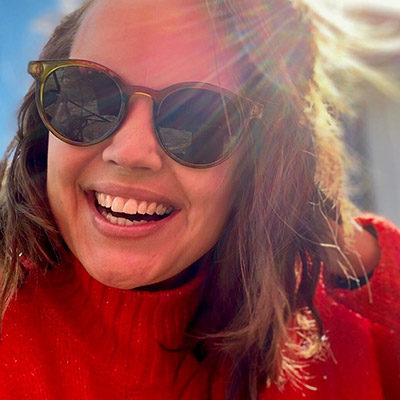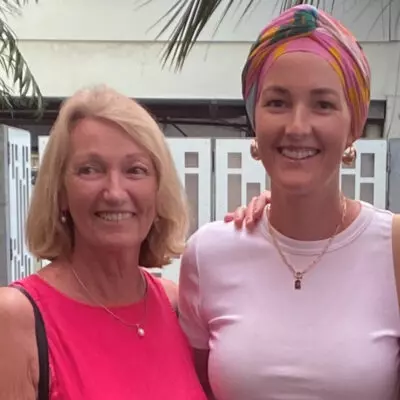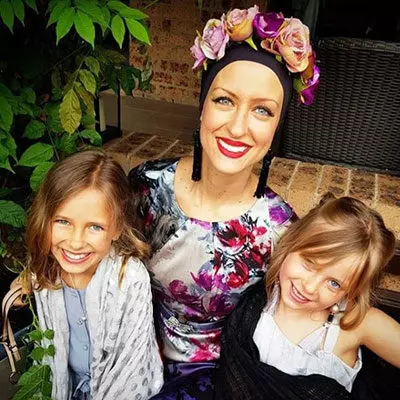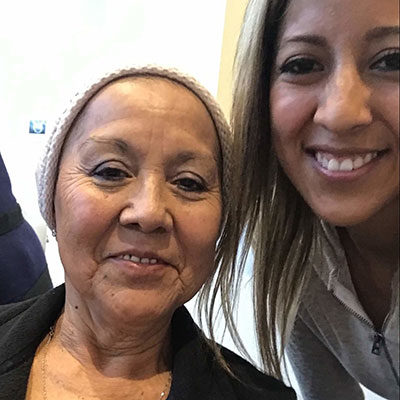I’m Vicky, a 33-year-old public speaker, workshop facilitator and coach. I’m also now a full-time mum, so most of my daily duties include preparing never-ending snacks, impromptu dance-breaks and general toddler wrangling. In my spare time I love to get creative, meet new people, share stories, explore new places and find ways to have fun every day.
At the time of my diagnosis, I was 29 years old. I had an accomplished FIFO career, had been newly married for 6 months, had just bought our first home and were planning to have a baby in the next year.
I’d felt a lump in my neck and assumed it must be muscular or that my glands were up from a virus. I was a fit, healthy 29-year-old with no previous history of Lymphoma in the family. After a month of testing, I was told I had Stage IV Non-Hodgkin Lymphoma.
I was then thrown into fertility preservation, failed fertility preservation, chemotherapy, Zoladex implants, scans, tests, hair loss, weight gain, hospitalisation, identity change, isolation, the inability to work, reassessing life plans and so much more.
The actual diagnosis is still a bit of a blur even now, but I remember feeling shocked, angry and confused. Not just about the cancer itself but more about the other impacts of treatment – specifically the risk of infertility. We’d only been married 6 months, had bought our first home two days prior and now we’d been rudely initiated into the club nobody wants to join – the Cancer Club. I had one choice to make: receive medical treatment that could save my life but if successful, that same treatment would probably leave me infertile. I was heartbroken.
Once treatment commenced, I was surprised at the lack of support available to me – I didn’t ‘tick the box’ with most charities as I was young, female and not diagnosed with a specific ‘women’s cancer.’ It was such a confusing time. I would reach out to charities looking for mental health support and ways to connect with other young women in the same situation, but then be turned away. So, when I found out about Look Good Feel Better, I was over the moon that I was eligible and I couldn’t wait to attend a workshop.
I was hoping for guidance, a starting point and a community that I could relate to. My hair had fallen out a few days before my workshop and I attended with my newly shaved head. At that stage in my treatment, I was still feeling physically OK-ish, but I was mentally overwhelmed. I looked mostly like myself, still with my own eyebrows and eyelashes, but couldn’t help thinking “when they fall out, where do I even start with drawing on eyebrows? How do I tie a headscarf? What do I need to look for in a wig?” Lots of questions that the internet just sent me round in circles with. I was craving real human connection and the Look Good Feel Better workshop was perfect for that.
I took away practical advice like make-up tricks, self-care tips and options for head coverings, but I also left feeling empowered and re-energised from a few hours of fun.
Friends and family were grateful that I’d finally found the like-minded support and human connection I’d been looking for. The physical changes resulting from cancer treatment can have such a huge mental impact on a patient – Look Good Feel Better workshops give patients the skills and confidence to leave the room feeling empowered and with options.
The life-long impacts and mental health challenges following remission were way more of a shock to me than the actual diagnosis. Cancer is still mainly viewed in terms of the medical diagnosis and treatment of a physical illness, but I found it to be far more mentally, socially and emotionally challenging, than just a disease of the body.
I will be forever grateful for the Look Good Feel Better program. It gave me a place to find the understanding and connection I’d been desperately seeking, at a time when many other avenues weren’t available. I always recommend Look Good Feel Better to others going through treatment. It’s the one place I felt welcomed, understood and had fun!
It has taken several years for me to mentally heal, process all the life changes and re-connect physically with my body. If only it happened overnight, like in the movies! What helped me the most during my recovery was finding ways to recreate the same confidence and connection that the Look Good Feel Better program provided during treatment. Reaching out for help, finding communities to connect with, sharing my story; all of these things and more were crucial to my recovery.
That said, I’m now a mum to my beautiful miracle baby girl, loving life, having more fun, caring less about things that aren’t important, appreciating more and being fortunate enough to work in my dream job supporting other incredible women. In a lot of ways, cancer was the best thing to ever happen to me. It truly changed my life.
support more Australians




